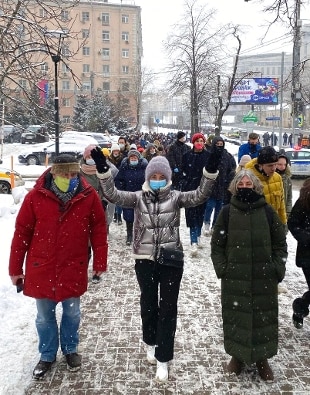Navalny's wife released
Navalny, new day of protests in Russia.
Over 4,000 arrested in different cities
Protest for Navalny, over 3,400 stopped
Navalny shows Vladimir Putin's "secret palace".
The wife Yulia: "Police keep an eye on me"
Share
January 31, 2021 Tension is still high in Russia due to anti-government protests that continue to inflame the country's main cities. A new Sunday in the streets in dozens of Russian cities, which have accepted the appeal of the opponent Aleksei Navalny, imprisoned two weeks ago on his return to Russia from Germany, where he had spent 5 months to be treated after
the poisoning
last summer .
At the end of the protests, in about 300 cities of the country, the toll is about 4,500 arrests, according to independent media: among them, several dozen journalists and
Navalny's wife, 44-year-old Yulia,
who was released after a few hours spent in a police station. Many images spread on media and social networks, which show peaceful parades under the snow but also scenes of police violence to immobilize and arrest demonstrators, to block access to the subway and contain the marches.
In
Moscow
alone
,
where the most popular demonstration was held, there were 1,349 arrests. Fifteen of those arrested are accused of attacking police representatives in the capital, according to the state agency Tass. Clashes and arrests also in
St. Petersburg,
where the police have denied having used tear gas. As for Yulia Navalnaya, she was stopped exiting a subway stop, transferred to the Shcherbinka police department, northeast of Moscow, and released with an administrative statement a few hours later.
International reactions
On the international front
, US Secretary of State Antony Blinken
strongly condemned the arrests. The Biden Administration chief of diplomacy spoke of "brutal tactics" by the police. Moscow responded by accusing the US of being the promoters of the protests. "We call for an end to interference in the internal affairs of sovereign states and we remind you of your responsibility", wrote the Foreign Ministry on Facebook, "Secretary of State Antony Blinken's support for the violation of the law is another confirmation of the role of Washington "in promoting protests" from behind the scenes.
The head of European diplomacy also expressed his disappointment at the repression of demonstrations
. Josep Borrell,
who is planning a mission to the Russian capital in the coming days to discuss precisely these issues as well as EU / Russia bilateral relations, challenged "even today the widespread detentions and the disproportionate use of force against demonstrators and journalists in Russia". "People - he added - must be able to exercise their right to demonstrate without fear of repression. Russia must respect its international commitments".
Italy
denounced "the brutal repressions and the thousands of arrests of peaceful demonstrators" who "can only continue to arouse emotions and sentiments of firm condemnation", as reported by sources at the
Farnesina
. "We call for the release of those who were arrested only for having peacefully made their voices heard and expressed their ideas without violence," added the same sources. "The majority are on our side, let's wake them up" was the message with which Navalny appealed to his supporters from Matrosskaya Tishina prison to get them to demonstrate.
Already a week ago,
Saturday 23 January
, on the first day of protests, tens of thousands of Russians took to the streets in over a hundred cities against Putin's long government, accused of stagnation and corruption. Also on that occasion, over 4 thousand demonstrators were arrested while in the following days various personalities close to Navalny, from brother Oleg to lawyer Lyubov Sobol, were placed under house arrest on charges of violating anti Covid restrictions by inviting them to demonstrate.
The detention of Navalny's spokesperson, Kira Yarmysh, who had finished the nine days in prison inflicted on her for unauthorized demonstration, was extended with the same charge. In recent days
, the Kremlin
has also tried to stem the mobilization on social networks. The Roskomnadzor, the Russian telecommunications authority, last Friday summoned the heads of the main platforms, from
Facebook to TikTok
, to ask them not to spread the appeals to participate in the demonstrations.
Telegram is
also being targeted
for a channel where activists are disseminating the personal data of policemen involved in the repression of protests. Everyone risks economic sanctions.

